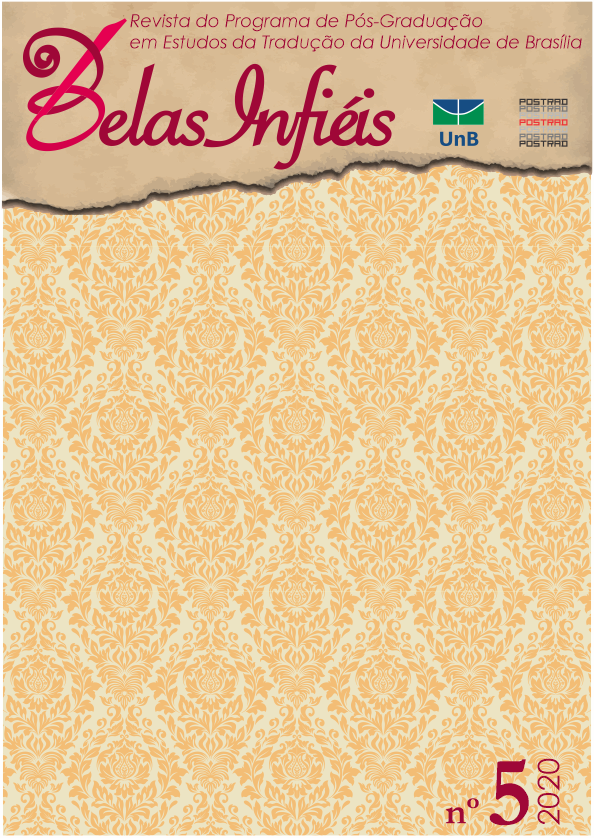Elizabeth Bishop's translation of “Pink Dog” to the contemporary Bahian context of slam poetry: a process of recreation
DOI:
https://doi.org/10.26512/belasinfieis.v9.n5.2020.26762Keywords:
Poetry Translation. Domestication. Poetry Slam. Urban ViolenceAbstract
"Pink Dog" by Elizabeth Bishop is a denunciation poem about a marginalized social type hidden behind the beauty of Rio de Janeiro’s carnival in the 1960s. This article comments and justifies a domesticated translation of this poem for the city of Salvador, Bahia, in the end of 2010s. The domestication process happened through linguistic-cultural choices into the Bahia-Salvador variety of Brazilian Portuguese. Some elements have been largely preserved, such as form and tone. Regarding the tone of denunciation, playfulness and aggressiveness were kept but also aggravated by the style. The translation can be characterized as poetry slam for its most violent and popular "beat". Thus, by contextualizing the source and target texts and with the support of Robert Bly’s (1986) poetry translation methodology, this article presents strategies and decisions that were made during the recreation process (BRITTO, 2002). The domestication is justified by the constant urgency to denounce and update the abuses of violence in Bahia through poetry similarly masked by the social importance of carnival as in Rio de Janeiro.
Downloads
References
ASKEW, Kelly M. As Plato Duly Warned: Music, Politics, and Social Change in
Coastal East Africa. Anthropology Quarterly, v. 76, n. 4, p. 609-637, 2003. Disponível em: https://www.jstor.org/stable/3318282?seq=1. Acesso em: 20 jul. 2020.
BLY, Robert. The eight stages of translation. The Kenyon Review, v. 4, n. 2, p. 68-89, 1982. Disponível em: https://www.jstor.org/stable/i403449. Acesso em: 20 jul. 2020.
BRITTO, Paulo Henriques. Para uma avaliação mais objetiva das traduções de poesia. Eutomia, Recife, v. 1, n. 20, p. 226-2,42, dez. 2017. Disponível em: https://periodicos.ufpe.br/revistas/EUTOMIA/article/view/234813. Acesso em: 16 jul. 2020.
COSTA, Márcia. São Paulo e Rio de Janeiro: a constituição do Esquadrão da Morte. Anais do XXII Encontro Anual da ANPOCS. Caxambu/Minas Gerais, 1998.
CUCINELLA, Catherine. Dress up! Dress up and dance at Carnival!: The Body in Elizabeth Bishop's Pink Dog. Rocky Mountain Review of Language and Literature, v. 56, n. 1, p. 73-83, 2002. Disponível em: https://www.jstor.org/stable/1348014?seq=1. Acesso em: 20 jul. 2020.
D'ALVA, Roberta Estrela. Um microfone na mão e uma ideia na cabeça ”“ o poetry slam entra em cena. Synergies Brésil, n. 9, p. 119-126, 2011. Disponível em: https://gerflint.fr/Base/Bresil9/estrela.pdf. Acesso em: 20 jul. 2020.
DE MELLO NETO, David Maciel. ‘Esquadrão da morte': Uma outra categoria da acumulação social da violência no Rio de Janeiro. Dilemas-Revista de Estudos de Conflito e Controle Social, v. 10, n. 1, p. 132-162, 2016. Disponível em: https://revistas.ufrj.br/index.php/dilemas/article/view/7752. Acesso em: 20 jul. 2020.
DE OLIVEIRA BATISTA, Eduardo Luis Araújo. O método de Elizabeth Bishop na tradução de poemas brasileiros. Cadernos de tradução, v. 1, n. 15, p. 55-68, 2005. Disponível em: https://periodicos.ufsc.br/index.php/traducao/article/view/6582. Acesso em: 20 jul. 2020.
PYM, Anthony. The moving text: Localization, translation, and distribution. John Benjamins Publishing, 2004.
VENUTI, Lawrence. The translator's invisibility: A history of translation. Routledge, 1995.
VENUTI, Lawrence. Escândalos da Tradução. Traduzido por Laureano Pelegrin, Lucinéia Marcelino Villela, Marileide Dias Esqueda e Valéria Biondo. São Paulo: EDUSC, 2002.
Downloads
Published
How to Cite
Issue
Section
License
Copyright (c) 2020 CC BY

This work is licensed under a Creative Commons Attribution 4.0 International License.
Given the public access to this journal, the texts are free to use but requires the recognition of the original authorship and initial publication in this journal to be properly stated.
 The journal allows the use of works published for non-commercial purposes, including the right to submit the work to publicly accessible databases. Published contributions are the sole and exclusive responsibility of the author(s).Â



















